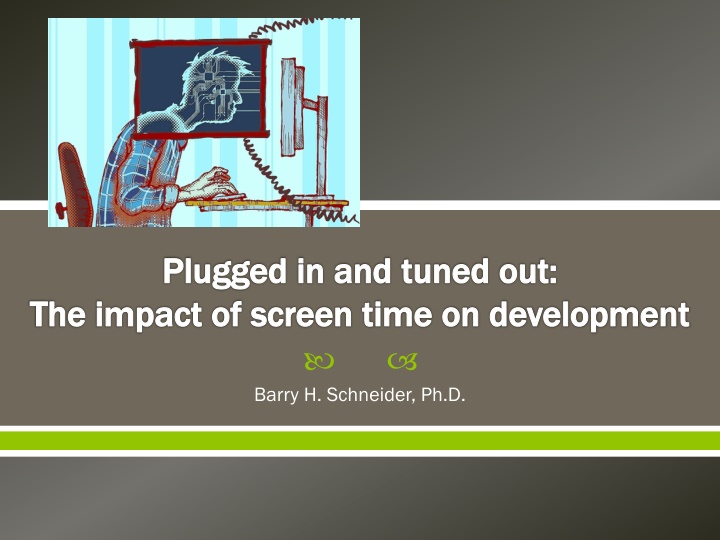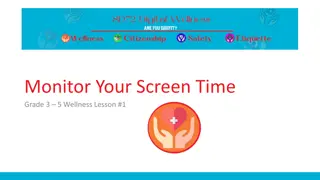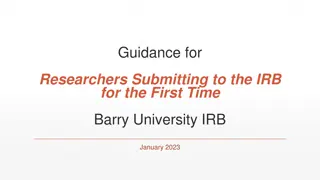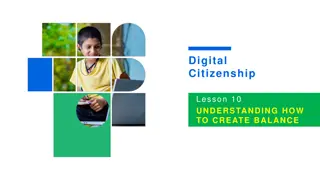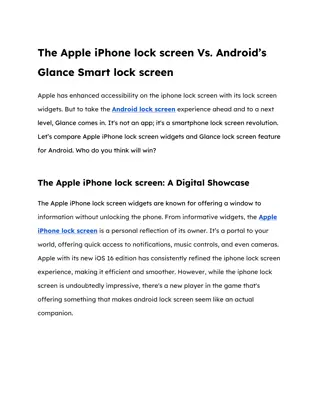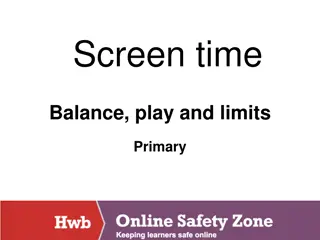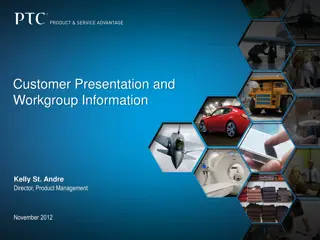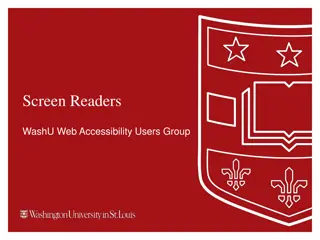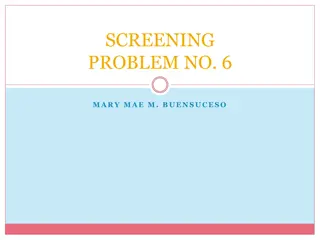Impact of Screen Time on Development by Barry H. Schneider, Ph.D.
Clinical psychologist specializing in children's relationships, social anxiety, and ADHD discusses the effects of electronic communication on development and human interaction. Explores the addictive nature of internet use and the potential consequences of excessive screen time. Shares personal experiences and insights on balancing technology usage for a healthy lifestyle.
Download Presentation

Please find below an Image/Link to download the presentation.
The content on the website is provided AS IS for your information and personal use only. It may not be sold, licensed, or shared on other websites without obtaining consent from the author.If you encounter any issues during the download, it is possible that the publisher has removed the file from their server.
You are allowed to download the files provided on this website for personal or commercial use, subject to the condition that they are used lawfully. All files are the property of their respective owners.
The content on the website is provided AS IS for your information and personal use only. It may not be sold, licensed, or shared on other websites without obtaining consent from the author.
E N D
Presentation Transcript
Plugged in and tuned out: The impact of screen time on development Barry H. Schneider, Ph.D.
Introducing myself Clinical psychologist since 1977 Professor of psychology since 1981 Specializes in children s friendships, social anxiety and ADHD Have done research on the effects of electronic communication on children s relationships with other Have lectured in 22 countries and conducted research in the U.S., Canada, Italy, France, Cuba, Costa Rica, Taiwan and Spain.
Overview of the evening Film clip of a poetic statement of the crisis A somewhat broader introduction to current scientific thinking on the effects of the proliferation of access to the Web Small-group evaluations of some possible solutions Concluding remarks Your questions
Some opening thoughts "Technology is Destroying Human Interaction" "Technology is Destroying Human Interaction"
Understanding Internet Addiction Dictionary definition of addiction: 1. a strong and harmful need to regularly have something (such as a drug) or do something (such as gamble) 2. 2. an unusually great interest in something or a need to do or have something (from Webster s dictionary) People can be addicted to things that have no redeeming value OR to good things that produce negative effects when consumed in excess MY POSITION: THE INTERNET IS LIKE FOOD MY POSITION: THE INTERNET IS LIKE FOOD OR WINE: MAY BE WONDERFUL IN OR WINE: MAY BE WONDERFUL IN MODERATION; ADDICTIVE WHEN CONSUMED MODERATION; ADDICTIVE WHEN CONSUMED EXCESSIVELY EXCESSIVELY.
Showing my friends from Italy around the Harvard campus I used: 1. Website of the Harvard museum to find out its hours 2. Mapquest to find the best way from my bus stop to the Harvard museum 3. Google to find a route for a walking tour 4. Facebook while sitting on a bench as they chased a squirrel 4. Email and text messaging when one of them got lost while taking photos of the squirrel 6. The Harvard website to find information about the university 7. Yelp to find the best place to have supper 8. Open Table to reserve a table 9. Google Maps to find the restaurant WOULD I HAVE BEEN BETTER OFF SHUTTING MY SMARTPHONE?
When the internet first came out. Newspaper headlines reported research indicating that Internet use was correlated with loneliness and depression. (Kraut and colleagues, 1998) It was widely assumed that the Internet use caused the loneliness and depression. Few considered the possibility that it was the loneliness and depression that caused the Internet use ---- lonely, sad people rushed to get online. As time went on and Internet use became almost universal, this correlation was no longer found.
Reduction hypothesis Although it now seems unlikely that Internet use causes loneliness and depression, it remains possible that the Internet diminishes the quality of close relationships Sherry Turkle, a Harvard scholar, maintains that the Internet is diminishing the intimacy of friendships. Her 2012 book is provocatively entitled Alone together: Why we expect more from technology and less from each other. Facebook has the audacity to co-opt the term friend. True friendship cannot be that superficial. Electronic communication may also be making family life superficial if family members do not spend quality time together.
Could the Internet improve rather than harm friendships? For certain children and adults, yes. Some people who are uncomfortable expressing feelings face to face prefer the relative anonymity of the Internet People who dislike their personal appearance may feel more comfortable with a medium in which personal appearance is less important Some people feel that they have more control online over when they connect to others and whom they connect to. Some people use the Internet to find people who are similar to themselves, especially if they are different in some important way from others in their immediate social worlds
What people may benefit? Shy people People who have trouble expressing their opinions in a face-to-face conversation People with uncommon personal schedules (e.g., night owls) whose friends and associates may not be available when they are People who have trouble finding support and companionship among people in their immediate environment The best film on this subject is a Belgian film Ben X https://www.youtube.com/watch?v=nAiufwSyM Ps
How do shy kids use the Net? Schneider s own research compares the way shy, anxious kids and outgoing, friendly, popular kids use the Internet There is no difference in terms of the time spent on line Shy kids use more of their on-line time in non-social uses of the Net. Some but not all of this time, especially video-games, is not spent doing what they need most to do make contact with others The most important difference was in their use of e-mail, .txt and chat. Many outgoing, friendly, popular kids refrained from using technology to badmouth others or express anger and sadness. They used the technology to set up face-to-face meeting times for this. The shy kids expressed their feelings using electronic media.
The rich-get-richer hypothesis Proposed by Dutch psychology Patty Vanderberg and her colleagues States that the Internet is basically used by people who are already good at making friends to make more friends and enhance friendships that they already have
The compensation hypothesis states that the Internet is mostly used by young people who have trouble relating to others face to face
Which hypothesis is confirmed by research? In studies conducted with adolescents, there is more support for the rich-get-richer hypothesis There is however, some support for the compensation hypothesis IMPORTANT : TIME SPENT IMPORTANT : TIME SPENT ONLINE MUST BE ONLINE MUST BE DISTINGUISHED FROM DISTINGUISHED FROM HOW HOW THE TIME IS THE TIME IS SPENT!!!!!! SPENT!!!!!!
VIDEO GAMES ARE ADDICTIVE May help a bit with some visuospatial skills, I suppose Probably increase aggressiveness, especially among kids who are already somewhat aggressive Fill up time without providing significant learning activities or interpersonal content
SOCIAL MEDIA Can be used properly or abused As discussed earlier, can enhance relationships Cyberbullying is proliferating, making it easier to spread rumors and exclude others from a social group than previously In many cases, the same kids are both cyberbullies and face-to-face bullies
IS INTERNET ADDICTION REAL? Definitely There was considerable pressure to include Internet Addiction in the new list of mental-health disorders, which was published in 2013 In the end, the only form of internet addiction that was included is internet gaming disorder Some professionals have begun to treat Internet addiction Some summer camps, retreat centers, offer detox programs As with many other mental-health disorders, prevention is of primary importance, especially for children and adolescents internet gaming disorder
HOW CAN PARENTS HELP? At this point, we will break into small groups of 5 people. Each group will rate each of the solutions on the 6 solution cards on a scale of 1 (not useful or appropriate) to 10 (highly useful and appropriate). Then, please spend a few minutes thinking of other solutions that you feel would help kids make appropriate use of the Internet without becoming addictive.
For further reading All of these are available at amazon.com in print and Kindle editions. A practical guide for parents who want to help their kids use the Internet wisely not a shocker trying to convince you to try to turn it off entirely: A A Parent's Guide to Understanding Social Media: Helping Your Teenager Parent's Guide to Understanding Social Media: Helping Your Teenager Navigate Navigate Life Online Life Online by Mark Oestreicher and Adam McLane, 2012 Sherry Turkle s well-known book on how the new technology may be removing intimacy from our close relationships: Alone Alone Together: Why We Expect More from Technology and Less from Each Together: Why We Expect More from Technology and Less from Each Other Other, , 2011. Some good ideas for parents who want to help their kids make and keep friendships and improve the quality of the friendships: The The Friendship Factor: Helping Our Children Navigate Their Social World Friendship Factor: Helping Our Children Navigate Their Social World- -- - and It It Matters for Their Success and Happiness Matters for Their Success and Happiness (Kindle Edition) Kenneth Rubin and Andrea Thompson, 2002 and Why Why (Kindle Edition) A readable summary of the main ideas and research on children s friendships and how to improve them. Includes a chapter on relating online. Childhood Childhood Friendships and Peer Relations: Friends and Enemies (International Texts Friendships and Peer Relations: Friends and Enemies (International Texts in in Developmental Psychology) 2nd Edition, Developmental Psychology) 2nd Edition, Barry H. Schneider, 2016
